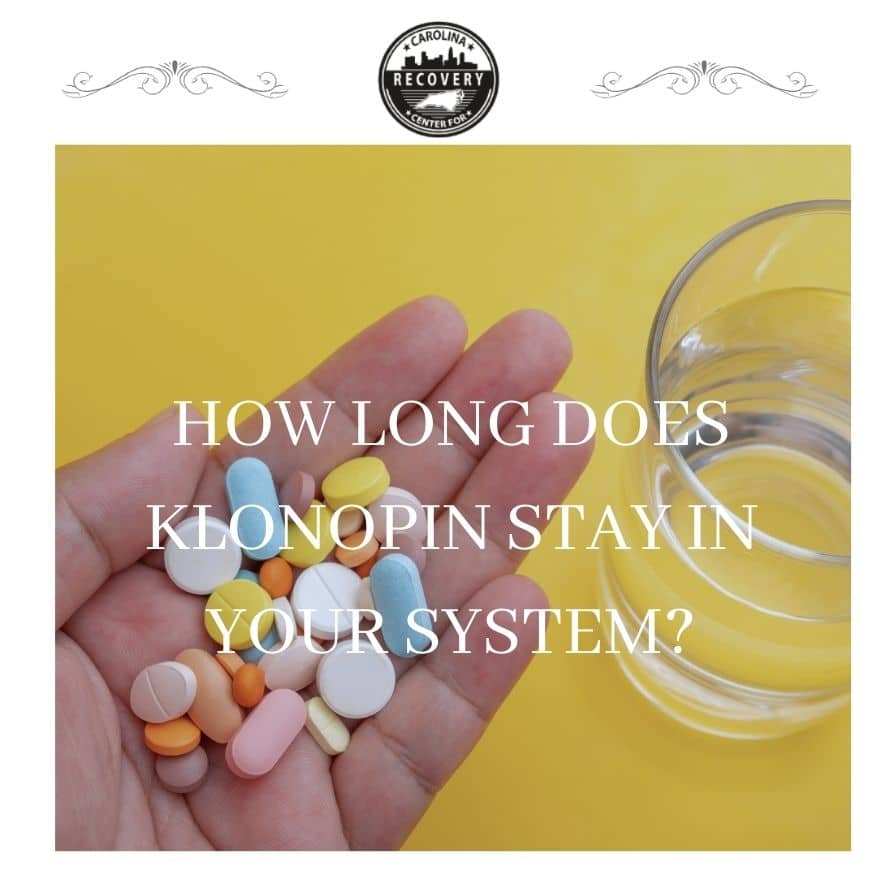How Long Does Klonopin Stay in Your System?

Medically Verified: 2/1/24
Medical Reviewer
Chief Editor

All of the information on this page has been reviewed and verified by a certified addiction professional.
Klonopin is the brand name for a benzodiazepine medication called clonazepam. Clonazepam is approved to treat panic disorder as well as seizure disorders like epilepsy. In some cases, clonazepam may be used to limit the symptoms of alcohol withdrawal and manage insomnia.[1]
While Klonopin is effective in treating a few medical and psychiatric conditions, this substance is highly addictive, and nearly one-fifth of all benzodiazepine use can be connected to substance abuse and addiction.[2]
If you or a loved one abuse Klonopin, knowing how long it stays in your system can prevent you from taking too much at once and suffering an overdose. It can also help you predict when withdrawal symptoms will begin if you are detoxing.
What are the Effects of Klonopin (Clonazepam)?
Many people abuse Klonopin to experience a drowsy and euphoric high. While this medication can soothe panic attacks, prevent seizures, help people sleep, and limit the symptoms of alcohol withdrawal, it can produce addictive and adverse effects.
The common effects of clonazepam abuse include:[3]
- Feelings of tiredness
- A rush of euphoria
- Irritability
- Dizziness and confusion
- Blacking out
- Coordination and balance issues
- Memory issues
- Nausea
- Loss of appetite
- Depression
- Paradoxical anxiety
- Cravings for more Klonopin
- Withdrawal symptoms when you cannot use the substance
It is important to note that if you are abusing Klonopin, you are at an increased risk of experiencing an overdose. This risk becomes even greater if you mix clonazepam with other substances like alcohol.
If you or a loved one exhibit the following symptoms, you might be suffering from a Klonopin overdose:[4]
- Extreme lethargy
- Unconsciousness
- Confusion
- Dizziness
- Poor coordination or shakiness
- Quick side-to-side eye movements (nystagmus)
- Blurry vision
- Slurred speech
- Weak pulse or low blood pressure
- Irregular or shallow breathing
How Long Does Clonazepam Stay in Your System?
Klonopin has a half-life of 20 to 50 hours. A drug’s half-life refers to the amount of time it takes your body to eliminate half of the dose. After 4 to 5 half-lives, your body will eliminate all of the clonazepam from your body.
However, metabolites of Klonopin may remain in your system longer. The metabolite that clonazepam leaves behind in your system is referred to as 7-amino clonazepam.[5] This is the chemical that drug tests look for to determine whether you have been abusing Klonopin.
How long clonazepam is detectable in your system varies depending on the type of drug test being used:
Urine
Urine tests are the most commonly used type of drug test because they are generally the most reliable and least invasive drug test available. Typically, Klonopin is detectable by a urine drug test for 4 to 6 days after you last use it.
It is important to note that some people may test positive for Klonopin long after 6 days. This typically occurs among individuals who routinely abused the substance over a long period, as the metabolites built up in their system faster than the liver could eliminate it.
Saliva
Saliva tests are usually less accurate than urine tests, as there are techniques people can use to skew the results. However, some companies may require you to submit to a saliva drug test before offering employment. Studies have found that saliva tests can detect Klonopin in oral samples for up to 5 or 6 days.[6]
Blood
Blood tests are not as commonly used as urine or saliva tests, as they are invasive and costly. However, these tests can detect Klonopin in your system for about two half-lives. This means you will test positive for Klonopin for a little over 3 days after your last use.
Hair
Lastly, hair follicle drug tests can detect any substance (including Klonopin) in your system for up to 90 days. Each one of your hair follicles has a blood vessel that feeds your hair growth cells, allowing any drugs you consume to travel to your hair. Since hair only grows about one-half-inch per month, follicle drug tests can detect substances for three months.
Which Factors Affect How Long Klonopin Stays in Your Body?
While there are general detection times that are common among most individuals, certain factors can affect how long Klonopin stays in your system. If you have been abusing Klonopin for several years, the substance will remain in your body longer than an individual who has only been using it for a few days.
Other factors that affect how long Klonopin stays in your body include:
- Age
- Gender
- Overall health
- Weight/body fat percentage
- The pH of your urine
- Urine concentration
- The dosage you take.
- Frequency of use
- Liver health
Finding Help for Clonazepam Abuse and Addiction
If you or a loved one suffer from Klonopin abuse or addiction, recovery is possible. Long-term clonazepam abuse can put you at risk of developing physical health conditions, symptoms of mental illness, and life-threatening emergencies like overdoses. Attending a drug rehab program can provide you with the support and treatment you need to maintain long-term sobriety.
To learn more about our benzodiazepine addiction treatment program, contact Carolina Center for Recovery today.
References:
- https://www.nami.org/About-Mental-Illness/Treatments/Mental-Health-Medications/Types-of-Medication/Clonazepam-(Klonopin)
- https://pubmed.ncbi.nlm.nih.gov/30554562/
- https://medlineplus.gov/druginfo/meds/a682279.html
- https://www.ncbi.nlm.nih.gov/books/NBK482238/
- https://pubmed.ncbi.nlm.nih.gov/12845398/
- https://pubmed.ncbi.nlm.nih.gov/25549207/

